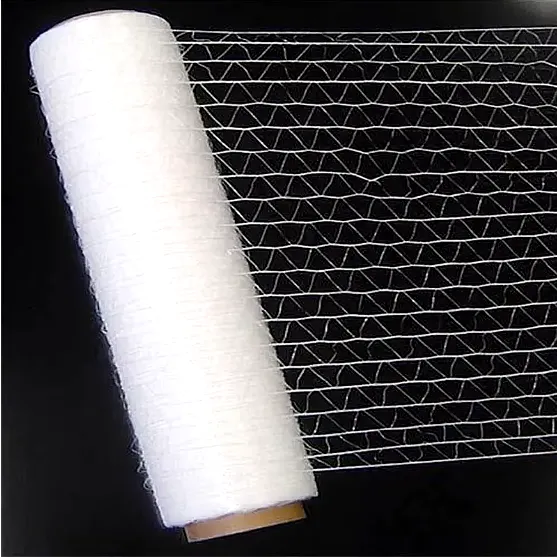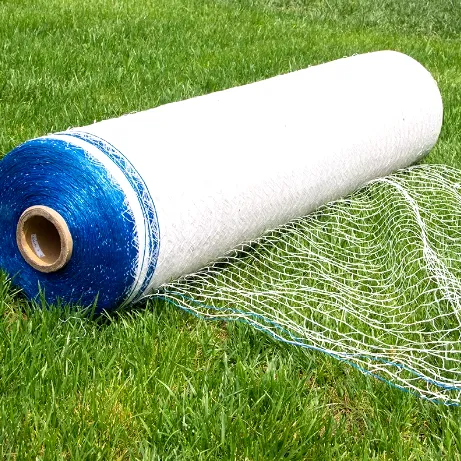Biodegradable Strong Plastic Pallet Netting for Hay Wrap
Biodegradable Strong Plastic Pallet Netting for Farming Hay Net Wrap
If you’ve ever unwrapped a sweaty pallet of hay or potatoes and sighed at the condensation, you’ll understand why breathable pallet netting is quietly taking over from stretch film. This Chinese-made solution—our Biodegradable Strong Plastic Pallet Netting for Farming Hay Net Wrap—keeps loads tight while letting moisture escape. In practice, that means fewer moldy surprises and better quality on arrival. To be honest, the first time I saw it used in a humid packhouse, the reduction in spoilage felt… obvious in hindsight.

What’s driving the switch?
Two things: ventilation and sustainability. Agri logistics is leaning into breathable wraps for eggs, potatoes, hay, and even greenhouse trays that “sweat” in transit. At the same time, buyers want lower plastic footprints. This netting blends durability with biodegradable/compostable options (formulations can be tuned), which—many customers say—makes procurement easier with ESG reporting.
Material, build, and specs (real-world, not just lab)
Origin: China. Typically a raschel-knitted net using bio-based or biodegradable resin systems (common blends: PLA/PBAT), UV-stabilized for outdoor farm use. The mesh structure grips irregular loads while allowing air exchange. Below are indicative specifications—actual figures may vary by customization.
| Parameter | Typical Value (≈) | Notes |
|---|---|---|
| Material | PLA/PBAT blend or bio-PE option | Compostable grades available on request |
| Mesh/Stretch | 15–30% controlled stretch | Helps load retention without crushing |
| Width | 500–600 mm | Custom widths available |
| Roll length | 1,000–3,000 m | Core: 2"/3" paper or plastic |
| Tensile strength | ≥ 25 MPa (ISO 527, ≈) | Real-world may vary ±10% |
| UV resistance | ≥ 500 h (ISO 4892-2) | Outdoor farm storage compatible |
| Service life | 12–18 months | Under typical agri logistics |

How it’s made and tested
Process flow: resin selection → monofilament extrusion → raschel knitting → spooling → QC. Testing includes tensile (ISO 527), elongation (ASTM D882), load retention and pallet tilt/drop trials, UV aging (ISO 4892-2), and for compostable grades, EN 13432 disintegration/biodegradation audits. I like that the vendor actually shares test sheets—rare but reassuring.
Use cases and real gains
- Hay and straw: lets bales breathe; fewer warm spots.
- Eggs, potatoes, onions: reduces condensation and skin damage.
- Nursery trays, produce crates, bottled beverages: lighter wrap, better ventilation.
Feedback highlights: “We cut pallet damage by ~15%,” one EU distributor told me; a Midwest hay co-op measured an 18% drop in spoilage after one season—small sample, but still.
| Vendor | Compostable option | UV hours | MOQ | Lead time | Price (≈) |
|---|---|---|---|---|---|
| YJ Wire Mesh (China) | Yes (EN 13432-ready) | ≥ 500 h | 100 rolls | 15–25 days | Mid-range |
| Euro NetCo | Yes | ≈ 400–600 h | 50 rolls | 10–20 days | Premium |
| AgriWrap APAC | Selected SKUs | ≈ 300–500 h | 200 rolls | 20–30 days | Value |

Customization that actually matters
Options include color coding (farm/route IDs), roll lengths matched to auto wrappers, edge reinforcement for heavy bales, anti-snag finishes, and bio-content levels tuned to local compliance. Private label? Sure—most buyers do.
Mini case notes
- Hay exporter (Spain): switched to Biodegradable Strong Plastic Pallet Netting for Farming Hay Net Wrap, reported faster cool-down after baling and fewer returns.
- Egg packer (Southeast Asia): ventilation cut condensation in reefer lanes; wrap usage per pallet dropped by ~22%.

Compliance and notes
Relevant standards: ISO 527/ASTM D882 (mechanicals), ISO 4892-2 (UV), and for compostable grades, EN 13432. Facilities with ISO 9001/14001 tend to maintain tighter batch consistency. Quick tip: ask for current test reports; real-world results can drift with farm dust, sun, and handling.
Citations
-
Anti Hail Net | UV-Stable, High-Strength Orchard ShieldNewsNov.17,2025
-
Anti Bird Netting – UV-Stable, Durable, Humane ProtectionNewsNov.17,2025
-
Welded Wire - Durable, Rust-Resistant Mesh, Custom SizesNewsNov.17,2025
-
Garden Mesh Sun Shade – UV-Resistant, Durable, Custom SizesNewsNov.17,2025
-
Bird in Net Solution: Humane, UV-Resistant Bird NettingNewsNov.17,2025
-
Stainless Steel Filters: Durable, Washable, High-FlowNewsNov.10,2025












